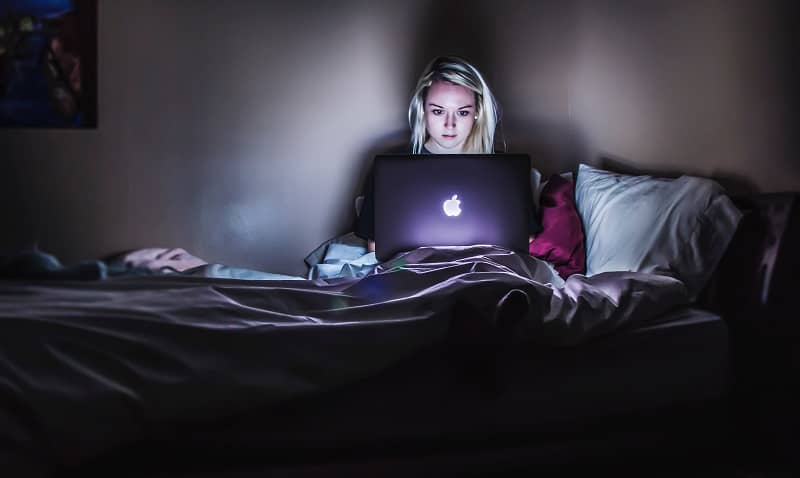
19 Feb Tips to Reduce Screen Time | How to Set a Limit That Works?
A rapid uptick in screen time before bed has led to many health issues for younger ones and adults alike. The only way to compensate for the lack of sleep is to plan ahead and be consistent.
Technology is the new black. We can’t sustain ourselves without gadgets. The pandemic has made us more dependent on gadgets than ever before!
With schools and college classes and office meetings being held on mobile phones and laptops, it’s the need of the hour.
Amidst all this, one thing nagged us all. We have no schedules. People are always on their mobile phones.
We’re literally forging the lines of a Healthy Amount of Screen Time for Adults.
Reducing screen time is intricately related to minimizing the use of screens in your free time.
Switch off all screens right before your sleeping hours.
Yes, you need to stay away from all screens to have a good night’s sleep. That’s a pretty established fact by now.
Thus, this begs one to question: How to Reduce Screen Time?
Is there an easy way out when we’re now psychologically conditioned to immerse our senses in these screens?
So, first, let us break down how to reduce screen time when you’ve got the most opportunity to succeed in doing so!
How to Reduce Screen Time Before Bed?

Follow these action steps to help you get unstuck and get over your phone addiction:
- Get in the habit of scheduling ahead of time
- Set a motivation or goal for the next day
- Fix a sleeping schedule and stick with it
- Keep aside the gadget
- Do some reading right before bed
- Install dim lights to induce sleep
- Use sleep trackers
- Be consistent and determined
With these points laid out, you should have a fair idea of what we’re talking about. Though, if you like details, feel free to scroll down for more clarification and tips.
Well, this past year, most of us have wondered How to Reduce Screen Time in Quarantine.
After all, in the lack of anything else that’s “interesting”, we’ve all been glued to the screens for a major part of the day.
Most of the time, lack of awareness of one’s own schedule, motivations, and even procrastination leads to more screen time than required.
Regardless, taking steps to reduce your screen time doesn’t have to be hard.
But that only applies when you have self-awareness and sheer determination to go with it.
Get Started with 8 Practical Ways to Reduce Screen Time
So, coming down to the steps, here are a few to help you figure out How to Reduce Screen Time Before Bed.
#1. Set a Time and Cement It in Your Routine
You need to figure out your priorities, mate! Not figuratively, but literally. Plan your bedtime way ahead during the day.
That can be set according to your choice. But once you fix it up, it is inflexible.
Believe it’s an unbreakable oath to yourself. You cannot violate it or there will be consequences. In fact, there will be later down the road.
#2. Keep Yourself Motivated for the Next Day
Checking your phone or even binge-watching Youtube is more of a psychological need. Your brain tricks you in all sorts of ways.
We have tendencies to check our phones regardless of needs. That shows we need external motivation to reduce screen time more than ever.
So, what can you do? Well, one way to get out of this vicious cycle is to set a goal for the next day. The goal has to be accomplished early on in the day.
Do you like exercising? Fix up a routine you’ll have to do in the morning.
Try some Yoga Postures for Back Pain early in the morning. It will not only get you ready for the day but also fix that back pain you get from sitting in front of screens all day long.
#3. Figure Out Your Sleeping Schedule

Bedtime is the hardest to control screen usage. We ignore sleep schedules to complete that one project, assignment, or series! Stop it from now on.
Set a time and don’t stay awake past that. Do your work earlier in the day so that you can keep night times aside.
If, on the other hand, your working hours fall during the night, sleep enough beforehand.
Don’t mix work with pleasure and sit with your laptop in bed when it’s naptime. It’s not the place to work, rather it’s your sanctuary where you rest and rejuvenate.
In fact, you won’t be able to keep at it for too long anyway. Not sleeping enough will make you lose focus.
The better way would be to sleep enough and start afresh.
#4. Keep the Gadgets Away
Put your phone somewhere out of your reach. Keep it away from you before you plan on sleeping.
If you’re addicted, you may also have to be extra diligent and patient with yourself. Don’t self-blame or start inner dialogues of pity and shame if you can’t succeed at first.
However, do try to be strict with yourself and limit your technology consumption.
Before sleep, you need to be away from any gadgets for at least half an hour.
Engage yourself in anything other than that.
In case you need reminders or alarms to wake up, buy a traditional alarm.
However, you wouldn’t need it for long. As you get used to a fixed sleep time, you’re more likely to wake up on your own. Courtesy of the inner circadian clock we all have!
#5. Read a Book Before Bedtime

One of the most underrated tips on how to reduce screen time would be to shift to old-school methods. They are harmless and real effective, though.
For once, keep your phone aside and dig in your favorite storybook.
This will not only make you sleep well but will also develop your love for reading. Most people find reading before bed helps them doze off and sleep more peacefully.
Reading can actually slow down your heart rate as you relax and release tension. It does take your focus away from all the worries of the day.
Not to mention, you’ll also limit your exposure to the blue light of your phone.
PRO TIP:
If you totally despise reading, listen to a podcast or an audiobook before bed. That’s actually much better than staying awake and binge-watching Youtube or Netflix.
#6. Use Dim Lights
Lights are a crucial element when it comes to sleep. In fact, many of us find it hard to doze off with the lights on.
Bright lights don’t accommodate your body’s internal clock, either. It doesn’t activate your brain to get you ready for sleep.
In general, low and dim lights make us sleepy. However, if possible, keep all the lights off, and you’ll have the best nap time.
In any case, switch off any bright lights installed in your room. If you would like to read a book before bed, you can use light from a side table lamp.
Or if you use an e-reader, buy one with a backlight to help you read.
All these measures set the mood to sleep.
#7. Use Sleep Trackers
There are some good sleep trackers that can help you check in on your sleep behavior.
But how can this help you reduce screen time? Well, it acts as a psychological motivation.
People seek to improve their sleep timings and make corrections after they track their unhealthy habits.
Thus, a sleep tracker will act as a nudge to develop a better sleeping schedule.
What’s more?
You get to keep track of your heart rate, breathing rate, nightly blood oxygen saturation levels, and REM sleep.
Imagine how much you can learn about your body with this data alone.
So, if not yet, go ahead and get yourself a sleep tracker.
#8. Be Consistent for at Least 30 Days
Do you know it can take 18 to 254 days to form a new habit?
While the time to develop a habit varies, you must stick through the process for at least a month.
Now, you really have to have the determination to achieve this.
Changing your entire routine for a month is no joke. Though, the good news is you’ll find a healthier you on the other side.
So, the target may be tough, but your resolution should be tougher!
But what should be an ideal parameter to limit your screen time?
The Ideal Screen Time Limit for Adults

What is a Healthy Amount of Screen Time for Adults?
Ideally, adults should limit their screen time to two hours each day.
However, today, it’s highly improbable to be able to achieve this.
Most of us spend anywhere from 10 to 12 hours watching one or the other screen.
Work timings also make it so that we can’t avoid sitting in front of screens for a major part of the day.
So, if you’ve to use your device, here’s How to Minimize Screen Time!
How to Reduce Screen Time When You Can’t Avoid Usage?
The following suggestions should help you have a better sense of how to structure your own routine.
#1. Take Your Breaks
You work hard, you need to take breaks in between! That is a way to ensure relaxation and mitigate negative health effects. Take time to be away from your screen in the office.
- Choose the time to take breaks and stretch.
- Focus on a distant object for about 20 seconds every 1 hour.
Adding to it, while you’re at your workplace and already using the computer, try to avoid checking on the phone. People are often found checking phones in between which only accelerates the negative effects.
#2. Set That Time
Time to work, time to play, time to cook, and time to take a break. Every factor depends on time. Streamline your schedule and set time for everyone and everything.
Though working extra might make you earn some extra pennies, it’ll cost you more to get your eyes treated if you keep on spending extended hours on screen.
Schedule your screen and non-screen duration wisely to avoid both the excessive usage of phones and work hamper.
#3. Try Phone Calls
Go old school. Try phone calls instead of texts. That way you also get to the point and will not be distracted to make small talk.
Adding to it, you can also switch to paper pen mode instead of making notes on your phone to remember things. Make it a habit to bring notepads to the meetings to maintain the minutes.
Also, students make it a habit to write down notes rather than clicking the pictures and never going through them again.
#4. Prioritize Your Family
You are working hard for your family. But when did you have dinner together? Try to know each other. This way you also minimize your screen exposure. Bond with close ones.
You Can Be a Role Model for Your Kids
Kids will look up to you. Try to Minimize Screen Time yourself and then advise them. You never know when they learn. That way, you both would interact, bond, and celebrate each other’s success as well.
#5. No Gadget Zones
You need to take control now of How You Reduce Screen Time.
It needs some hard-and-fast rules. The dinner table, bedtime, and break hours; Plan these activities around your no-gadget time.
It is among the effective ways to control screen time and indulge in more one-to-one interaction. Doing this improves mental health as well.
Since, as much as the internet has benefits, it has become the primary cause of depression and stress among teens and adults as well.
#6. Use Apps to Stay in Control
Phone companies make apps to keep track of your usage. They even offer apps to remind you to stop using the phone after a while. Try to utilize them.
You can block the apps to reduce screen time. Adding to it, try switching to grey mode; this will remove the beautiful colors of the apps and curb your phone addiction successfully.
#7. Do Not Disturb Mode
Do not disturb mode is your easy pass to limited screen time. Keep the phone on it for a while. Then, have a breath. Take some time for yourself. Enjoy life, too!
You can turn off the notification if you find it hard to resist checking your phone every time it pings, turning off the notification can be of great help.
In spite of all this, though, you may get stuck if you’re a student.
Students find managing their sleep schedule a bit hard due to tight project deadlines and exam schedules.
Moreover, most students are heavy users of social media, which instigates addiction.
So, here are some tips to reduce screen time specifically for students.
How to Reduce Screen Time As a Student?

As a student, it’s an unspoken pact to get scolded for excessive use of mobile phones. With a pandemic setting, students were more on-screen than ever.
But we too know the dire consequences of excessive screen time.
Thus, What is a Good Screen Time Limit for students?
Considering the school works, assignments, and everything else, child psychologists suggest 8 hours.
Not following through with this suggested timeline can result in:
- Red and fatigued eyes causing optic issues,
- neck cramps,
- immobility, and
- obesity.
But the most important question we have here is:
How to reduce your screen time to avoid all of the above consequences?
Ways to Reduce Screen Time for Students
Follow these tips to reduce your screen time right away:
#1. Prepare a Schedule to Reduce Screen Time
Always use a routine to keep track of ongoing activity. Schedules help foresee how to save time. Who knows you can find ways to stop depending on the phone altogether with a good routine.
#2. Don’t Mess Up Your Target
We all have that last-moment assignment that we delay. Now the thing is, you can’t miss your target time for that “one thing”. That is a disruptive mess. In short, stop procrastinating.
#3. Divide the Hours of Phone Usage
Division of 8 hours of usage in 30 mins throughout the day can help. Suppose your schedule has even time distribution all day long. That way, you won’t feel like the schedule is “imposed”. Plus, you’ll be able to care for your health and address phone addiction.
#4. Don’t Use Gadgets before Bed
Gadgets before bed are a BIG no-no. You get distracted and you often use it more than required. Bedtime is for sleeping, you need to make that 8hr mark. So, no compromise on beauty sleep.
#5. Use Digital Detoxes
There are several ways to detox. Use the one section of the day to use the phone. Then use the phone next time in the same bracket of time. That is an extreme measure but use your detoxes all day long.
#6. Workout
We rarely think of our bodies. That is not done, you know. If we don’t respect this gift of nature, we are on the path of self-destruction. Wake early, exercise for some time, and make breakfast for yourself.
#7. Indulge in a Hobby
We all have that hobby we forget over time. Use it to gain yourself back. It’s your ticket to mental satisfaction and freedom. The ultimate way to reduce screen time! Paint, sketch, sing, or go wild; look for that favorite me-time.
Now, let’s have an overview of the ideal screen time for you each day.
After all these measures, also remember to…
Celebrate Your Wins

Digital detox is not easy. You need to pat yourself each day for being so determined. Not everyone cares about themselves so much. So yes, celebrate those wins!
Let the Average Screen Time for adults lie between 6-8 hours. That way, you can even control the kids and limit their phone usage.
It’s not always possible to meet the limit. But with small goals, you can meet the target one day.
Now, you know how to reduce screen time. Don’t let your goals crumble with daily shortcomings.
Coming to the end, here are some of your questions answered.
Frequently Asked Questions
Here, we’ve addressed some of your burning queries to get you more informed about reducing screen time and the effects if you don’t.
The Central Message
The usage of technology is to make life easier. People living miles across can connect through video chat features.
With information stored in a nano-chip, we’ve everything we need at our fingertips.
But this does not mean, we need to make it a necessary evil. The dire consequence of using technology is not hidden.
Parents look up articles on How to Reduce Screen Time for Toddlers and their younger kids. The extra dependency on gadgets has made us crippling with laziness.
This is neither healthy nor advisable by health professionals. Everything should stay within a certain limit. There should be a check on phone usage.
A Healthy Amount of Screen Time for Adults is necessary. If adults get away with excuses, children are bound to follow them.
Most successful people ask to invest in social skills. That is what gadgets bereft us of.
So, instead of being a social media addict, try to reduce screen time, and connect with people around you.
You never know what gem of a person someone turns out to be once you turn away from your screen!



No Comments